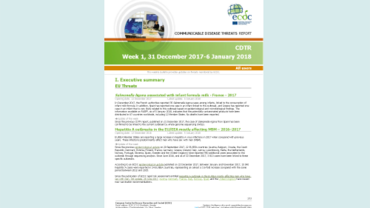Salmonella Agona outbreak associated with infant formula milk
On 6 December 2017, France reported an outbreak of Salmonella Agona in infants <1 years of age linked to consumption of infant milk formula based on an epidemiological investigation. Different brands of infant formulas from the same producer in France and distributed to different countries inside and outside the EU were implicated as the vehicle of infection in this outbreak.
As of 5 January 2018, the outbreak has affected 35 children <1 year of age in France and one infant in Spain. In addition, one infant in Greece is most likely linked to this outbreak based on epidemiological and microbiological findings.
The Institut Pasteur in Paris reported that S. Agona isolates associated with the outbreak displayed an atypical characteristic allowing the identification of cases probably associated with the outbreak.
A joint whole genome sequencing (WGS) analysis confirmed that the Spanish case is associated with the ongoing outbreak in France and may provide further confirmation whether also the Greek case and possible cases from other countries are associated.
Available evidence from epidemiological investigations in humans and traceability investigations in food identified five different brands of infant formula from a single processing company in France as the source of infection. The French competent authorities are reviewing the measures implemented by the involved processing company in response to this event.
S. Agona is the tenth most common Salmonella serotype in the European Union (EU). In 2012-2016, it was reported by 26 EU/EEA countries with 400-581 cases annually.
Broad recall likely to reduce risk for new infections
As of 5 January 2018, the distribution of the potentially contaminated products has been reported to 12 EU countries (Belgium, Bulgaria, Cyprus, the Czech Republic, France, Greece, Ireland, the Netherlands, Romania, Slovenia, Spain and the United Kingdom) and a list of countries outside of the EU. A broad recall of infant products, export ban and suspension of placing on the market, have been implemented since the beginning of December 2017. These measures are likely to reduce the risk for human infections remarkably.
A previous S. Agona outbreak in France in 2004-2005 was associated with consumption of infant formula manufactured by the same producer of the infant formula linked to the current outbreak.
ECDC is offering whole genome sequencing services to countries who do not have the capacity or possibility to conduct timely analysis. Public health authorities in all EU Member States who have received potentially contaminated products of infant milk formula and detect cases of S. Agona in infants <1 year are encouraged to report them to ECDC.
ECDC and the European Food Safety Authority (EFSA) are working on a joint assessment of this event.





